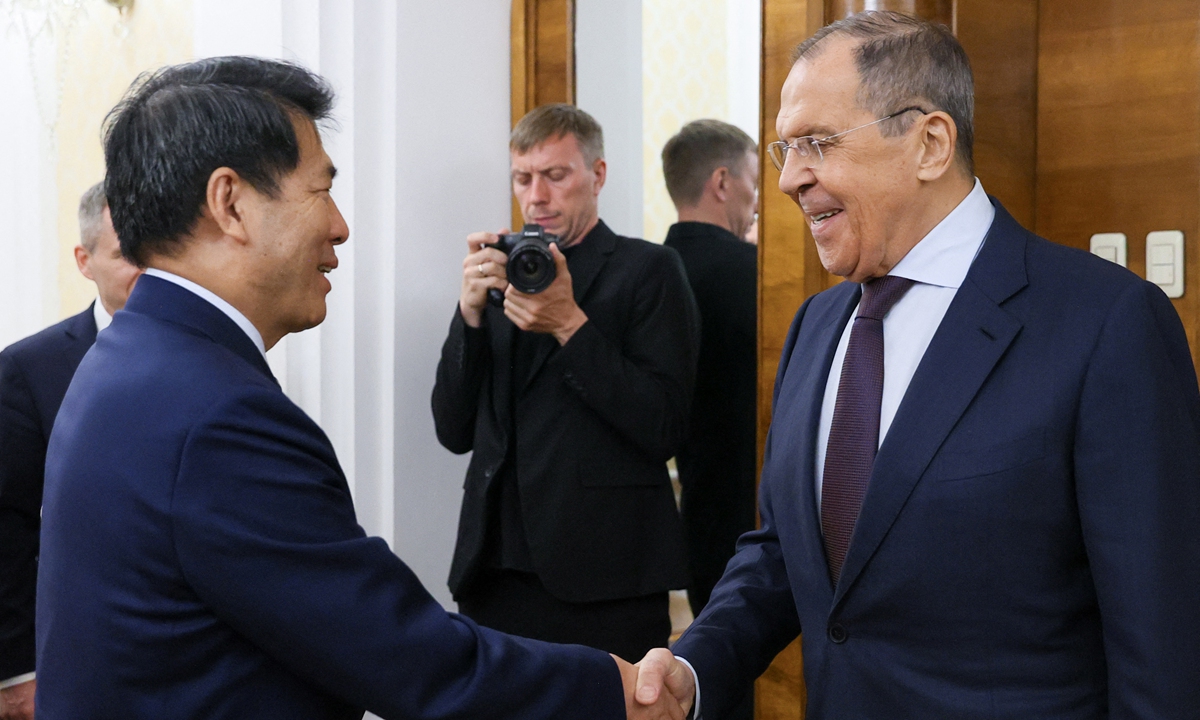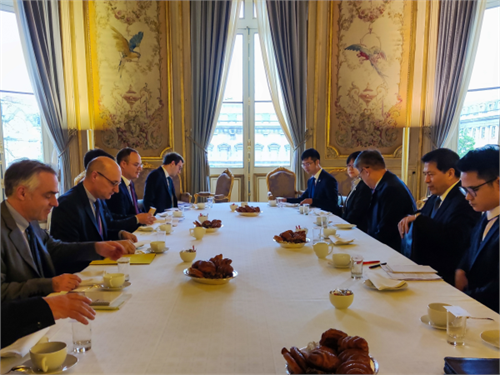Chinese special envoy talks with Russian FM Lavrov in Moscow
Europe should seize ‘rare window’ of communication instead of bias: experts

Special Representative of the Chinese Government on Eurasian Affairs Li Hui (left) meets with Russian Foreign Minister Sergei Lavrov in Moscow, on May 26, 2023. Photo: AFP
After concluding his trip to Brussels with a meeting with European Union officials, China's special envoy leading peacemaking efforts arrived in Russia on Friday. Experts said the Chinese side will make efforts to provide a rare window for negotiations, despite the meeting with EU officials showing that Brussels was talking like a US mouthpiece with bias and unreasonable requirements.
Li Hui, China's Special Representative on Eurasian Affairs, has arrived in Moscow on Friday. Li talked with Russian Foreign Minister Sergei Lavrov in Moscow for about 90 minutes, over the prospects for resolving the conflict in Ukraine, according to media reports.
On Thursday in Brussels, Li has met with Enrique Mora, the EU's deputy secretary general for political affairs, and Frederic Bernard, Head of Cabinet of President of European Council Charles Michel.
According to a statement released by the EU after Li met with Mora, the European bloc called on China to push Russia to "unconditionally withdraw all forces and military equipment from the entire territory of Ukraine within its internationally recognized borders."
Chinese Foreign Ministry spokesperson Mao Ning on Friday responded to inquiries about Li's meeting with the EU officials, saying that on the Ukraine crisis, China has consistently upheld an objective and impartial stance, actively advocating for peace talks and negotiations.
As the crisis unfolds in Europe, China calls for efforts to be made by European parties to put forward a peaceful resolution that is acceptable to all parties involved, Mao said.
EU's top diplomat Josep Borrell earlier this month claimed that China "cannot expect to be good friends" with the bloc without Chinese efforts to end the Russia-Ukraine conflict. Experts on Friday slammed the EU's such "requirements" on China as being unrealistic and unreasonable, as China is not a party to the conflict nor is it the instigator, and China does not have the right to compel any party to make important decisions as it is their own national affair.
Experts noted that the EU officials' remarks are "not so much a standpoint of Europe but rather words of the US through EU leaders' mouths."
Unlike major European powers such as France and Germany, which have tried to maintain diplomatic autonomy, the EU tends to align with the US while disregarding the region's own interests under tightened control from the Biden administration, Cui Heng, an assistant research fellow from the Center for Russian Studies of East China Normal University, told the Global Times on Friday.
Skepticism from the West over China's peace proposals is an outright rhetorical trap, shifting the blame to China while evading its own responsibility, when the escalating tensions are a direct result of the provocative actions of the West, experts said.
"It is quite ironic that those who stoke the situation are the ones speaking, while those who advocate for reconciliation are being forced to bear the responsibility," Cui said.
Observers said that China's role would provide an opportunity to convey the ideas of Europe to the Russian side while listening to Moscow's perspective.
It came at a critical juncture following the stalemate in the Ukrainian city of Bakhmut, as the deadlock provided a rare chance for negotiations between the two sides.
Europe should seize this opportunity for communication rather than further exacerbate the situation, as doing so would only lead to a deterioration of the regional security situation.

